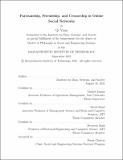Partisanship, Friendship, and Censorship in Online Social Networks
Author(s)
Yang, Qi
DownloadThesis PDF (5.215Mb)
Advisor
Tauhid Zaman
Terms of use
Metadata
Show full item recordAbstract
With the widespread adoption of social media in today’s society, it has become increasingly important to understand users’ behaviors and the underlying factors driving these behaviors. This thesis considers different aspects of this problem, from tie formation to influence campaigns, examining factors of partisanship, friendship, and censorship in today’s online social networks.
We begin in the first chapter with an overview of social media and the key behaviors of the users of these platforms and the platforms themselves that we will be studying. In the second chapter, we introduce the follow back problem, and examine how different following strategies and political ideologies can influence the follow back rate. After obtaining followers, one can then begin posting content to influence them. In the third chapter, we consider this type of influence campaign. Recent studies have shown that exposure to opposing opinions causes a backfire effect, where people become more steadfast in their original beliefs. We demonstrate a technique known as pacing and leading which can mitigate this backfire effect over time.
In the fourth chapter, we consider the challenge of inferring political bias in a hyper-partisan media ecosystem. From empirical studies in the previous chapters, we discovered that Twitter exhibited an anti-conservative bias when suspending users. However, many studies find that conservatives are more likely to share misinformation on social media. Therefore, it is possible that the suspensions are due to enforcing an unbiased policy aimed at limiting the spread of misinformation. Here, we evaluate the two possible hypotheses empirically by examining the suspension of Twitter users. We found that the observation that Republicans were more likely to be suspended than Democrats provides no evidence that Twitter was biased against conservatives. Instead, this asymmetry can be explained entirely by the tendency of the Republicans to share more misinformation.
Lastly, the COVID-19 pandemic created large shifts in how people stay connected with each other due to social distancing and isolation measures. In the fifth chapter, we study research questions around the impact of COVID-19 on online public and private sharing propensity, its influence on online communication homophily, and correlations between online communication and offline case severity in the United States. To do so, we study the usage patterns of 79 million US-based users on Snapchat, a large, leading mobile multimedia-driven social sharing platform. Our findings suggest that COVID-19 has increased private communication, while decreased publicly shared content when users are out-and-about, decreased homophily across locations, ages and genders, and has a positive correlation with widening gaps between across-state and within-state communication increases after the onset of COVID-19.
Date issued
2021-09Department
Massachusetts Institute of Technology. Institute for Data, Systems, and SocietyPublisher
Massachusetts Institute of Technology